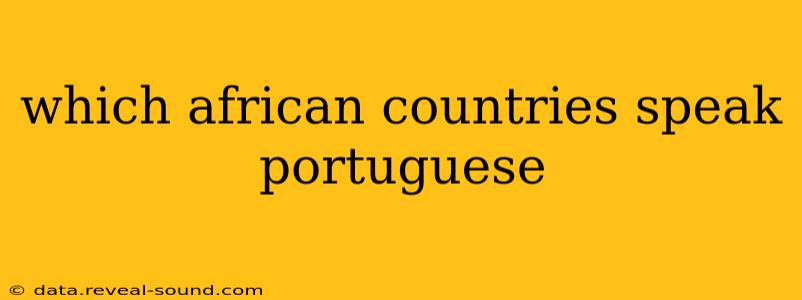Which African Countries Speak Portuguese?
Portuguese is a vibrant language spoken by millions across the globe, and its presence in Africa is a significant part of its rich history and cultural tapestry. Understanding which African nations are Portuguese-speaking is crucial for anyone interested in African history, culture, or business opportunities within the region. This comprehensive guide will explore the five African countries where Portuguese holds official language status, delve into the historical reasons behind this linguistic landscape, and address some common questions surrounding Portuguese in Africa.
What African Countries Primarily Speak Portuguese?
There are five sovereign African nations where Portuguese is an official language:
-
Angola: With a population exceeding 30 million, Angola boasts a significant Portuguese-speaking community. Portuguese is the official language of government, education, and commerce, although numerous indigenous languages are also spoken.
-
Mozambique: Another large nation with a population exceeding 30 million, Mozambique shares a similar linguistic landscape with Angola. Portuguese is the official language, with several local languages also prevalent.
-
Guinea-Bissau: This smaller West African nation, with a population of around 2 million, has Portuguese as its official language, reflecting its historical ties to Portugal.
-
São Tomé and Príncipe: This island nation off the west coast of Central Africa, with a population of around 200,000, has Portuguese as its official language. Its unique culture blends African traditions with Portuguese influences.
-
Cape Verde: Located off the west coast of Africa, this island nation, with a population of around 600,000, is another example of a Portuguese-speaking nation with a unique blend of African and European cultural traditions.
Why Do These African Countries Speak Portuguese?
The presence of Portuguese in these nations is a direct consequence of historical colonialism. Portugal established significant colonies in Africa during the Age of Exploration, beginning in the 15th century. These colonies remained under Portuguese rule until the mid-20th century, during the period of African decolonization. While independence movements resulted in the end of Portuguese colonial rule, the legacy of the language persisted, making Portuguese the official language in many former colonies.
Is Portuguese Widely Spoken in All Parts of These Countries?
While Portuguese holds official status, its usage varies across different regions within each country. In urban centers and among educated populations, Portuguese fluency is generally high. However, in more rural areas, local indigenous languages often dominate daily communication. The level of Portuguese proficiency also depends on factors like age and access to education.
Are There Other Languages Spoken in These Countries?
Absolutely! Each of these five countries is home to a diverse range of indigenous languages and dialects, reflecting the rich linguistic heritage of the African continent. While Portuguese serves as the official language for administration and formal settings, local languages are vital for community life and cultural preservation. These local languages contribute significantly to the unique cultural identities of each nation.
What is the Future of Portuguese in Africa?
The future of Portuguese in Africa remains strong, although efforts to promote local languages are increasingly important. While Portuguese remains essential for national unity and international communication, the preservation and promotion of indigenous languages is crucial for cultural diversity and national identity. The ongoing development of educational materials and initiatives aimed at fostering linguistic diversity ensures the future of both Portuguese and African indigenous languages.
This exploration of Portuguese-speaking African countries provides a foundational understanding of this significant linguistic and historical aspect of the continent. The rich tapestry of cultures and languages found in these nations provides fascinating avenues for further exploration and study.
